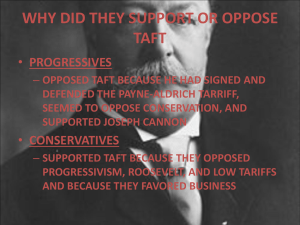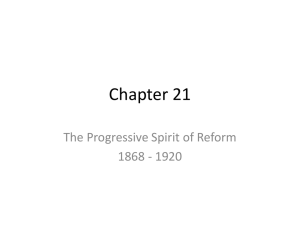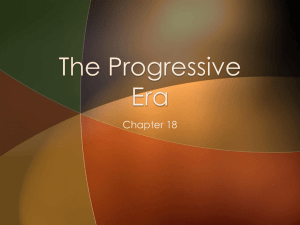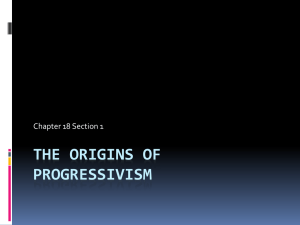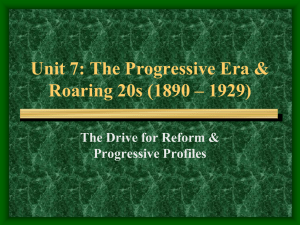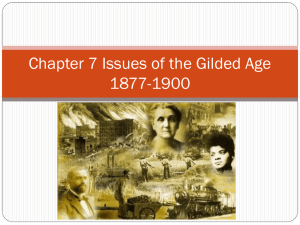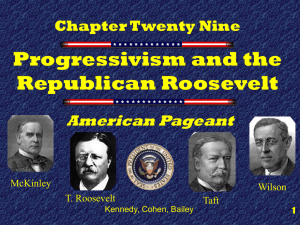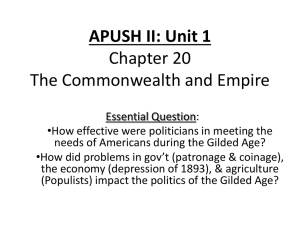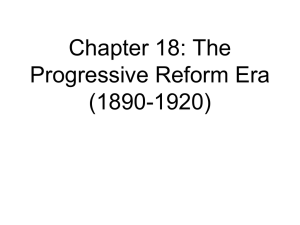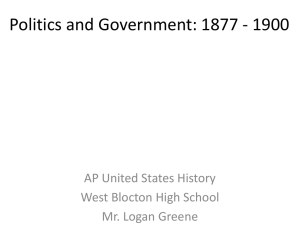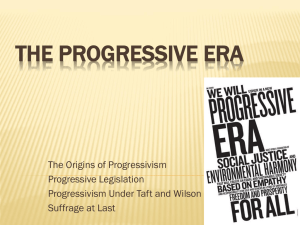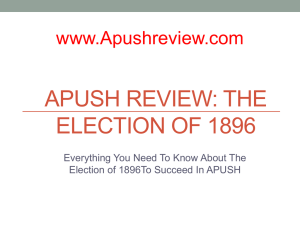Populism and Progressivism
advertisement
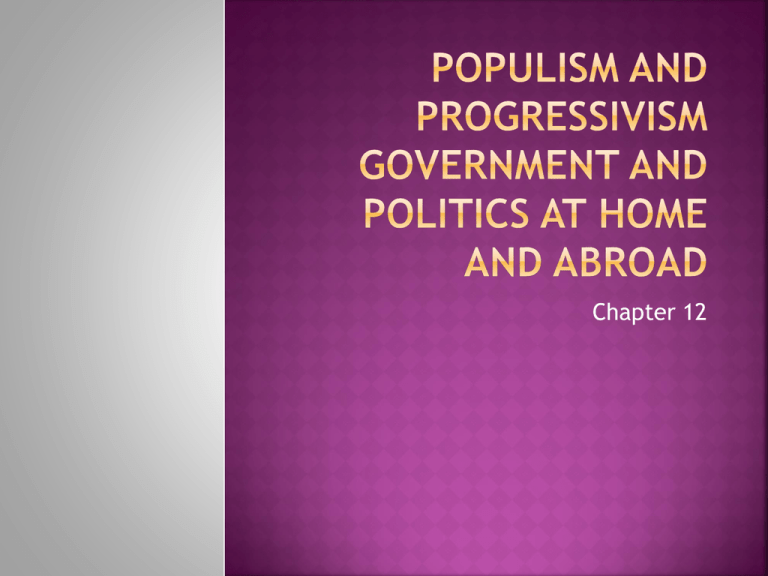
Chapter 12 Americans thought of themselves as living in a democracy- but the power of business seemed to call that into question. Who was in charge- the citizens or the corporations? Wasn’t it the government’s job to look out for the people? Then why were so many leaders siding with the industrialists? Industrial cities often ruled by Political Machines- men behind the scenes who held power- but not offices. Have been around for a century, but reached their zenith in the late 1800s. Used spoils system to make $$ for party leaders- generally through corruption or other illegal means Ran the most infamous “machine” in NYCTammany Hall. Cities had grown, but city government had not- bosses like Tweed took advantage of the gap. Controls city gov’t by controlling votes of immigrants, so he “helped” them in return for their votes, giving away more than $2 million in charity, and funding schools and hospitals. At the same time- Tweed gained as much as $200 million for himself/supporters through spoils, fraud and embezzlement. Political Reporter for NY Times- exposed Tweed’s actions in a series of Political Cartoons (Nast is credited with their modern creation) Tweed offered him $100,000 to stop, Nast refused. Samuel Tilden eventually prosecuted and Jailed Tweed in 1873. Boston, Chicago, Philadelphia, St Louis, and Cleveland also known for their political machines- these were often a main target for reformers One way Robber Barons got what they wanted was by “investing” in lawmakers- putting them on Board of Directors, or giving them stock within the company. Credit Mobilier: Construction Co created by Union Pacific RR, then hired by RR at ridiculous prices to build transcontinental with gov’t $$. Ends up making $75 mil on a $50 mil contract. Story breaks during the 1872 presidential campaign, 13 members of congress, and the VP found to be shareholders in the Co. Congressmen censured, VP replaced on ticket, but no other action. 1875. A group of mostly Republican politicians were able to siphon off millions of dollars in federal taxes on liquor. Diversion of tax revenues in a conspiracy among government agents, politicians, whiskey distillers, and distributors. Tainted Grant’s presidency- while there was never any direct evidence he was involved, some were his friends, and when scandal was exposed he kept attorney general from strong prosecutions. Divides of war have not faded. Republicans. Every Republican president elected from 1868-1900 had served in the union army, and they consistently hold 16 states in the North and West. Democrats: have the south, and do well with Catholic voters, especially the Irish in the cities. Have 14 “solid” states. That leaves 5 “swing” states- with NY and OH being the most important, the man who takes those takes the presidency, and that was typically a republican, they won all but 2 presidential elections. String of one term presidents, we have another dry patch of leadership during from 1876-1900 1. 2. 3. 4. 5. 6. 7. 8. 9. 10. 11. 12. 13. 14. Abraham Lincoln Franklin Roosevelt George Washington Theodore Roosevelt Harry Truman John Kennedy Thomas Jefferson Dwight Eisenhower Woodrow Wilson Ronald Reagan Lyndon Johnson James Polk Andrew Jackson James Monroe 15. 16. 17. 18. 19. 20. 21. 22. 23. 24. 25. 26. 27. 28. Bill Clinton William McKinley John Adams George H.W. Bush John Quincy Adams James Madison Grover Cleveland Gerald Ford Ulysses Grant William Taft Jimmy Carter Calvin Coolidge Richard Nixon James Garfield 29. Zachary Taylor 30. Benjamin Harrison 31. Martin Van Buren 32. Chester Arthur 33. Rutherford Hayes 34. Herbert Hoover 35. John Tyler 36. George W. Bush 37. Millard Fillmore 38. Warren Harding 39. William Harrison 40. Franklin Pierce 41. Andrew Johnson 42. James Buchanan Both Democrats and Republicans had internal issues, both depended on Patronage (Spoils) to keep supporters happy. Stalwarts(Roscoe Conkling) and Halfbreeds (James Blaine): two factions within the Republican party arguing about who should be in control of handing out spoils Mugwumps: Reformers within the party who wanted to limit patronage. Democrats also divided between southern and urban factions Presidency of Rutherford B Hayes was dominated by patronage- after all, that’s how he had been elected president. Constant demands made it difficult for Hayes to govern effectively- he proposed civil service reform, got nowhere By 1881 the number of federal jobs had tripled since 1865, from 53,000 to 166,000. Elected president in 1880, he was a halfbreed, and his VP Chester Arthur was a Stalwart. 4 months after election, Garfield was assassinated by Charles Guiteau, a disappointed office seeker and Stalwart. The assassination led to a call for civil service reform- the patronage system had been discredited. 1883 Congress created civil service reform. Pendleton Act designated a variety of federal jobs (10%) that would be filled via a competitive exam process rather than patronage. A 1st step to creating a professional bureaucracy. Today only about 30% of federal jobs are filled through appointment. Industrialists kept ties to both partiesafter all, you never know who will win…. Republicans favored high tariffs, Democrats had close ties to banking. US withdrew Greenbacks issued in the war in 1879, and returned to the Gold Standard. Grover Cleveland won the presidency in 1882: 1st president to openly oppose special treatment of business, and to advocate reform Wabash v Illinois has said states could not regulate RR, b/c RR operate as interstate commerce. So Congress acted to begin regulation. Created ICC to regulate RR, saying that all rates must be “reasonable and just”. Had power to investigate, but not power to enforce. Still, a step in the Right direction… In election of 1888 the main topic was the tariff. (1st time since civil war econ has been the main issue between parties) Cleveland won popular, but Benjamin Harrison (Grandson of William Henry Harrison) won electoral. Harrison a very passive president, but public is developing a strong outcry for trust-busting, and federal gov’t was taking notice. 1890 passed Sherman Anti-trust: outlawed agreements in “restraint of trade”. Still too vague, and with no provisions for enforcement. Proposed in 1890 by Republican representative William McKinleythe highest protective tariff in history of US, 48% on a variety of goods Reaction against tariff led people to vote for Democrats, and Grover Cleveland Re-elected in 1892, our only nonconsecutive president. Cleveland was laissez faire, and lowered tariff to allow greater trade/invisible hand etc…(though it didn’t go down that much) Tariffs and Silver the main econ issues of 1890s Worst financial crisis of 1800s, and the 1st depression of the new industrial age. 20% unemployment, 8000 businesses go bankrupt. Sparked by a collapse in the stock market, long term causes were overbuilding of RR and speculation in stocks. Gold reserves dip to dangerous levels, the federal deficit soars. Persuades many to give up laissez faire, people are looking for gov’t intervention Farmers didn’t need the panic to persuade them, they had been asking for gov’t help for some time. While farmers had influence in many agricultural states, those states had smaller populations, and farmers were losing national influence. In both the south and the west, the cycle of debt created huge burdens, and more and more farmers became motivated to seek political influence by attempting to break the hold of industry on the government. The common name for members of the Patrons of Husbandry, formed in 1867. Actually created for educational and social purposes, had meeting with lectures, picnics etc… to reduce the isolation common to farm families. Most successful in Illinois, Wisconsin, Iowa, and Minnesota 1st issue was against RRs- they protested unfair rates and grain storage charges. Had 1.5 million members by 1873. Asked for laws which regulated RRs and warehouses. Formed co-ops to store their own grain, and negotiate for better RR rates. Emerged in the 1870s- protesting the return to the gold standard, which meant there was less $$ available in the economy. Would eventually merge in to the populist party, which would take up “Hard” vs “Soft” money as a major political issue A lot like the Grange, with educational and social goals, but in the South. Main complaint was that farmers struggle with cashflow during much of the year. Wanted Federal gov’t to create a subtreasury which would loan farmers up to 80% of the value of their crops until harvest, and for the gov’t to run grain storage, not RR Grange and Farmer’s Alliance decided they needed a national party to fight for their rights. Created Populist party in 1891, and nominated James B Weaver for President in 1892. Wanted to expand beyond farmers to all “producers” saying “Eastern Establishment” of RR, Banking and Industry were exploitive Carried 4 states (very rare for a 3rd party) – had 9% of popular vote. Populist Platform 1892 asked for: Unlimited coinage of silver at a ratio of 16:1 to create inflation A graduated income tax to redistribute wealth. Government ownership of RR, telephone and telegraph Initiative, Referendum, and Recall on federal as well as local ballots Postal savings banks run by the gov’t. Direct election of senators An 8 hours workday. During panic of 1893 populists (and many others) were vocal in proposing silver as a solution to econ issues. If we base $$ on silver, not gold, we can have more, which will create inflation, (which is good for farmers),and those in debt would be able to get clear b/c $$ would be “cheaper”. For populists, silver represented the idea of a return to power of ordinary people, not the super-rich. Democratic party had a substantial silver faction “Silver Democrats”. Absorbed a number of populist ideas, so many threw their support behind Democratic nomineeWilliam Jennings Bryan. Given at Democratic national convention It is the issue of 1776 over again. Our ancestors, had the courage to declare their political independence of every other nation; shall we, their descendants, declare that we are less independent than our forefathers? No, my friends, that will never be the verdict of our people. Therefore, we care not upon what lines the battle is fought. Having behind us the producing masses of this nation and the world, supported by the commercial interests, the laboring interests, and the toilers everywhere, we will answer their demand for a gold standard by saying to them: You shall not press down upon the brow of labor this crown of thorns; you shall not crucify mankind upon a cross of gold Business leaders responded to populism and free silver by pouring $$ into the Republican CandidateWilliam McKinley, who won in a landslide. Bryan SO obsessed with Silver it turned people off, also populists were staunchly protestant, and fearful of immigrants/catholics etc… which created dissention in the party. Written by L Frank Baum in 1896 as a metaphor for the election. Dorothy (who represents the ordinary citizen) wore “silver shoes” (soft $, no one is sure of their power) to walk on the “yellow brick road” (gold standard- the path we all know) Scarecrow represents the mid-western farmers, Tin man urban labor. Cowardly Lion is William Jennings Bryan, the Wizard is McKinley. City of Oz is an industrial capital. Wicked Witch actually from East (they flipped it later for the movie) represents industrial owners. Economy began to improve, and populism began to die out. New gold sources in Australia, South Africa and Alaska increase the amount of $$ in circulation. Record harvests eased things for farmers American Imperialism changed the focus of the nation….. Populism failed as a 3rd party movement, but many of it’s ideas will be adopted by the rising progressive movement. Eventually the majority of their ideas will be enacted RR legislation/Trust busting Graduated income tax (gee thanks) Direct election of senators Initiative, referendum and recall on local ballots Federal savings banks. George Washington had warned the US to avoid “entangling alliances”. And with a few hiccups (War of 1812, Monroe Doctrine) MexAmerican War) we listened. Tended towards isolationism- we were building our own country, and our location kept us out of the action. But Industrialization has brought us into the world economy, and that will bring us into world politics as well- we want to show we are one of the “big boys” Manifest Destiny had in fact been fairly imperialist- we just conquered the land next door, and our own natives rather than “tropical dependencies”. Once our territory spread “sea to sea” we began looking in other areas: Alaska purchased in 1867 to keep Russia out of N America. We also occupied the Midway Islands, Hawaiian Islands and Samoa in the Pacific to facilitate trade and support our navy (12th in the world- after Chile). No more frontier- and many Americans felt a continued need for growth (safety valve) Panic of 1893 convinced industry they needed more than domestic markets Labor unrest growing- and gov’t thinks we could use expansion Subjugating Indians had made us experts on exerting control over the “less civilized” Instead of looking for land to settle, or for treasure, European (and Asian- Japan is involved) nations are looking for industrial resources and markets. European countries are small, and their economies are bigcolonies represent an ideal monopoly 3 types Political Imperialism Economic Imperialism Social-cultural Imperialism As Frederick Jackson Turner said- Americans have always been defined by the idea of a Frontier- exploring new lands and creating new opportunities. We’ve run out at home…. Became worried that Europeans would out play us for foreign trade markets….Senator Henry Cabot Lodge said “We must not fall out of the line of March”. Big part of imperialism is that white are not only the “fittest” (and therefore destined to rule) but have a “duty” to “civilize” other races….The “White Man’s Burden”. And we have experience- after all, look what we have done for African Americans and Native Americans…. Has been rising in importance in Europe since the Napoleonic Wars Alfred Thayer Mahan published The Influence of Sea Power on History in which he argued that Great Britain had become the most powerful nation in Europe by developing a strong Navy. Encouraged US government to start spending $$ on ships (which we do beginning in 1896 with 11 battleships) and to build a Canal across Central America (completed 1911) 1895-96. Border between British Guiana and Venezuela had been in dispute for decades- and became heated when gold discovered in disputed territory. Pres. Cleveland- citing Monroe Doctrine- warned Britain not to “overstep” bounds. Britain seriously offended – but didn’t have time to deal, they were in the middle of the Boer War, so accepted arbitration. Enhanced the prestige of US Our 1st foray into international politics as a powerful nation. 1895 Cuba (a remnant of the once mighty Spanish Empire) was attempting to gain independence. US has significant investments in Cuba (sugar plantations and mining interests) and we like the idea of them as independent- we’ll get better deals. Spain is NOT enthusiastic- enact harsh policies – Reconcentrado – to stamp out revolution, essentially imprisoning vast sections of the Cuban population. Newspaper owners (Hearst and Pulitzer) used the Cuban revolution to sell papers- publishing stories of atrocities. (called “yellow” from a popular cartoon at time of “yellow kid”.) Influenced how Americans felt about Spain’s policy- and our desire for war- “Jingoists” (warhawks) called for US to save Cuba William McKinley’s presidential platform in 1896 called for US intervention (to protect US business interests) Actually causes Spain to back down a bit- they don’t want to fight US- but war becomes unavoidable. Le Dome Letter: says McKinley is all talk, we get offended Feb 15th 1897 US battleship Maine blows up of coast of Havana – 260 Sailors die (84 survive) Cause of explosion unknown- but to Americans it seemed like obvious treachery, and revenge became the order of the day (“Remember the Maine!”) April 25th 1897- US declares war on Spain Description by Sec of State John Hay. It’s short, (just over a year) fairly painless (only 5000 Americans die, most from disease), and hugely popular. We fight not only in Cuba – where Teddy Roosevelt resigns as sec of navy and leads “Rough Riders” into battle. But also in the Philippines- where US joins forces with patriot Emilio Aguinaldo promising the Filipinos we will help them get independence (lies and fairytales- we give it to them in 1946) US promised Cuba independence as part of their justification for participation in the war. Wanted international support and to be seen as a world leader Cuba does become independent (and eventuallyREALLY poor- war pretty much destroys their economy) US takes Philippines, Guam and Puerto Rico – Spanish empire is done. Philippines created a debate about imperialism as a whole which interests are more important- political, economic, or moral? War as a whole helps bring US/England together- making them allies 1901 Supreme Court asked to determine whether or not people in newly acquired territories were American citizens- the answer is ….sort of It’s Congress’s job to determine which are which. “The Constitution does not follow the flag” Some rights apply to all American territories Others will not apply to those “unfamiliar with American law” Since we are collecting islands in the Pacific… We overthrew the Hawaiian monarchy (which is funny, b/c Europeans made Hawaii a monarchy in the 1st place) and annexed the Islands to protect the rights of pineapple plantation proprietors All through late 1800s China (once the most powerful econ in the world, now riding the struggle bus since they chose not to allow any new technology around 1500) has been forced to sign unequal treaties with European powers, and has been carved into spheres of influence. US feels left out- we are coming late to the party- so we suggest Open Door Policy so that all nations can exploit China equally. TR was a hero of the Sp-Amer war, and our youngest president (42 when McKinley shot) known for flamboyance and hugeness of personality. Loved America- and wanted the rest of the world to Admire her as well- firmly convinced it was our time to take a seat amongst the world powers. Expansionist- wanted to expand our influence for the good of humanity. “Speak Softly and Carry a Big Stick”- not afraid to bully others into his opinion 1904-05 Both claimed territory in Manchuria and Korea- and fought. Japan has spent 40 years modernizing and industrializing…. Russia, not so much. Japan’s new navy spanks Russia- which is SHOCKING for many Europeans, but they run short of men and $$. TR is worried about US interests in Pacificbrokers the peace (Treaty of Portsmouth) to end the conflict. TR wins Nobel Peace Prize Japan felt “robbed” of victory over Russia Naval race started between US and Japan Also- US doesn’t have a great track record with rights for Asians – already have Chinese exclusion, and California passed a law mandating segregated schools for Asian children. Japan VERY insulted, emperor appealed to Roosevelt. In “Gentlemen’s Agreement”, TR arranges to have California law repealed- Japan agrees to limit immigration Part of his vision for US was to use diplomatic power- as he did in brokering the peace treaty to end the Russo Japanese War. Worried about the growing strength of Japan, feared it would upset the balance of power and trade in Asia. Sent “Great White Fleet” on a “tour” of Asia (including Japan) so everyone could see our strength, and to prevent others from trying to muscle us out of trade. Inspired Japanese to increase the size of THEIR fleet to compete (that’s one of the issues of late 1800s- arms races and militarism) Canal across Isthmus of Panama had been begin by the French in the 1870s – they gave up on it. In 1903 US we want to get it going again- the problem is… the land we want belongs to Columbia, and they won’t let us build. TR secretly backs a revolution in Panama- and presto, we get our territory. Finish in 1914 at cost of $367 million Our treatment of Central/South American governments is earning us the nickname “Bully of the North” After Cuban independence, large sections of econ still controlled by US- so we make sure things work our way. Platt Amendment adopted in 1898 (end of Sp-American War) said that Cuba could not make treaties “which would weaken their independence” (meaning if we don’t like it) or incur debts (except to US) Basically- we want to dominate their trade. We also got the land for a naval base (Guantanamo) Latin American trade significant to US. They aren’t industrialized, we can sell them stuff – and they have boatloads of raw materials. Keeps US involved in Latin American politics, and we had made ourselves responsible for all of the Americas with the Monroe Doctrine way back in 1820- but that was pretty much just “talk” TR puts talk into action- saying that the US as a “civilized” nation had a “duty” to “police” those who were either “Uncivilized, undeveloped or both” (White Man’s Burden anyone?) We get involved in Venezuela and the Dominican Republic to “protect” them from European Domination- by dominating them ourselves TR wanted power and prestige for the US- his successor, William H Taft, wanted to make $$. Dollar Diplomacy says US foreign policy should be based on whatever will make the most $$. We get involved in political events (like a revolution in Nicaragua) so we can control the economic outcomes The 3rd of the “progressives” he is full of a sense of righteousness. Now our duty is to foster the spread of democracy – and “convert others to the principles of America”. Lots of interventions as he tries to get rid of military dictatorships in Latin America….which is a complete fail, as it is still the most common form of government there today Biggest area of intervention. 1913 a military coup d’etat under General Huerta executed the president of Mexico and led to civil war between Huerta and peasant (marxist) revolutionaries led by Pancho Villa. Wilson torn- hates ideas of marxism, but thinks Huerta is a murderer. US troops get involved after skirmishes on the US border kill 17 Americans- nearly led to full out war with Mexico (which might have kept us out of WWI) The period from just before the turn of the century through WWI became defined by a movement that emphasized correcting the social and economic injustices created by industrialization. Embraced by both political parties (as well as creating its own) it represents a new definition of expectations- that government should protect the public interest and restore social order. Populism had tremendous popular appeal- people wanted business regulation and social justice Progressives will fight for Trustbusting (esp for RR) passed 1903 and 1906 Income Tax- 16th amendment ratified in 1912 Credit/Currency reform- passed 1913, 1916 Direct election of senators- 17th amendment ratified 1913 Federal savings banks- 1910 Farm subsidies and relief- 1916 Progressives will succeed where populists had failed b/c they didn’t advocate a return to an agrarian economy- wanted to reform industrial society without hampering progress. Felt industry had widened gap between rich and poor to an unacceptable breach. But instead of an outcry from the proletariat, Progressives tended to be from the middle class, who were genuinely moved by the plight of poor, and wanted to do something about it- largest reform movement since 2nd Great Awakening Issues (beyond populist) Killing political machines- voting reform Improving urban living/working conditions Consumer protection (clean food/water) Conservation Women’s Suffrage An uprising of the working classes was a concern (this is when people really start worrying about communism)- but more, it was the concept of a “Christian duty” to help those in need- many early progressives were religious leaders Women also key in reform movements, after all, they have been seen as guardians of morality since the revolution. Volunteerism the only acceptable “career” for a middle class married woman, and this is the 1st generation with a large number of female college graduates Late 1800s a time with extreme Victorian morality- and there was concern that urbanization/industrialization brought traditional protestant values under attack Designed to help immigrant/poor families get on their feet and learn skills to help them better their lives Jane Addams- founded Hull House in Chicago in 1889 to teach immigrants English, offer classes in health/nutrition, and provide social gatherings for urban poor. Florence Kelley- Henry Street settlement in NY, fought for legislation to regulate hours and working conditions for women and children. Both women quite controversial b/c of socialist political views American Red Cross founded in 1881 by Clara Barton, who had been a nurse in the Civil War (Red Cross in General Florence Nightingale, Crimean War) Focus on first aid, water safety, and public health nursing programs in cities WWI and the Influenza epidemic of 1918 create phenomenal growth Liquor consumption had been increasing ever since Civil War- particularly prevalent among urban workers and immigrant Saloons were for men only- but the temperance movement will be led by women WCTU (founded by Francis Willard) a powerful lobbying group, put pressure on states to ban alcohol sales, championed planned parenthood and women’s suffrage. Carrie Nation most famous member, went into Saloons and smashed the bar with an ax- arrested 30 times Pretty successful during progressive age, by 1900 25% of Americans live in communities with restrictions on alcohol- but their real moment will come in 1919 with the 18th amendment All states have some form of mandatory public education by 1870and public high schools spread significantly in the 1880s and 90s. (parochial schools also saw big jump as many Catholics wanted to retain traditions) Illiteracy dropped from 20% in 1870 to 10% in 1900. By 1900, 25% of college graduates were women Self improvement: Chautauqua founded 1874, inspires others- lectures (Mark Twain) Journalism becoming important in forming public opinion- especially exposing what people might not have wanted to see in industrial society. Magazines and Newspapers becoming big business. TR coined the term- inspired by the work of Ida Tarbell (writing about JD Rockefeller and Standard Oil) Lincoln Steffens: The Shame of the Cities Theodore Dreiser: Sister Carrie Upton Sinclair: the Jungle US had been following Romantic movement pre/post Civil War- moved on to things that more reflected (and commented on) industrial society Mark Twain: Captured Humor and realism of American life- in authentic dialect. Tom Sawyer/Huck Finn Stephen Crane: Wrote about the harshness of the new “modern life”. The Red Badge of Courage (1895) a story of the civil war, which doesn’t glorify, but horrifies Reform work began at the state and local levelswhere populism already had a strong hold. Progressives broke up political machines in major cities like NY, Chicago, Cleveland, Detroit and Milwaukee. Simplified ballots (Australian Ballot), direct primary elections (no more back room deals. City Managers and professional bureaucracy Robert A Follette (WI) well known progressive governor, instituted a number of progressive reforms, and their success in his state helped inspire others to follow along. Initiative, referendum, recall in place in most states by 1920, as well as minimum wages, maximum hours etc. 16th Amendment (Income Tax) design to reduce the gap between rich and poor 17th Amendment (Direct election of Senators) meant to make federal officials more responsible to the people TR is the 1st “modern” president, the first to use gov’t to directly help the public interest- his vision was of an “umpire” to help make the world more fair. New Nationalism: Got federal regulation of Econ started – trust-busting (most famously JP Morgan’s in 1904) though he did differential between “good” trusts and “bad” trusts. Took regulatory laws that already existed and gave them teeth- like the Hepburn Act, so the ICC could enforce policy Actually believed in regulating more than fragmentingcombination and integration is efficient, and why should he punish success? often used his activities to gain popularity. (as opposed to really creating change) President Taft actually broke up far more trusts- but Teddy is loud and visible President is visible- he is the “leader” he should set the tone for policy. Most personally dynamic president since Jackson Sought a “Square Deal” for Business, Labor, and the Public Corporate regulation Consumer protection Conservation of natural resources Felt that it is the president’s job to intervene for the good of the nation. For example, during a Coal strike in 1902 he threatened to seize the mines and operate them with federal troops is owners refused to meet and negotiate. Created idea of arbitrators/mediators to settle disputes Shocked by The Jungle- TR creates a commission to investigate food conditions, and finds Sinclair hadn’t been exagerating Meat Inspection Act - required inspection of packaged meat, could not be sold w/o seal of approval Pure Food and Drug Act – required ingredients to be listed, and prohibited various dangerous medicines (1st step towards modern packaging) TR’s most significant and long lasting contribution- this is what puts him in 1st Column. Outdoorsman and sportsman- concerned by irresponsible use of resources. Heavily influenced by naturalists Guifford Pinchot and John Muir- TR creates US forest service to protect federal land from overdevelopment of timber, farming, and herding. National Reclamation Act: put federal gov’t in charge of building dams, reservoirs etc in west to ensure regulation National Park System: had been established with Yellowstone in 1872, but TR put aside 125 million acres, more than all previous presidents combined TR honored 2 term tradition, and “hand picked” his successor- William Howard Taft. Taft did not have TR’s personality, but actually accomplished more progressive goals- Doesn’t rock the boat, worked under the radar, but “busts” twice as many trusts, and got the 16th and 17th amendments passed Mann Elkins Act- finally gave the ICC the powers it needed to regulate. 1. 2. 3. 4. 5. 6. 7. 8. 9. 10. 11. 12. 13. 14. Abraham Lincoln Franklin Roosevelt George Washington Theodore Roosevelt Harry Truman John Kennedy Thomas Jefferson Dwight Eisenhower Woodrow Wilson Ronald Reagan Lyndon Johnson James Polk Andrew Jackson James Monroe 15. 16. 17. 18. 19. 20. 21. 22. 23. 24. 25. 26. 27. 28. Bill Clinton William McKinley John Adams George H.W. Bush John Quincy Adams James Madison Grover Cleveland Gerald Ford Ulysses Grant William Taft Jimmy Carter Calvin Coolidge Richard Nixon James Garfield 29. Zachary Taylor 30. Benjamin Harrison 31. Martin Van Buren 32. Chester Arthur 33. Rutherford Hayes 34. Herbert Hoover 35. John Tyler 36. George W. Bush 37. Millard Fillmore 38. Warren Harding 39. William Harrison 40. Franklin Pierce 41. Andrew Johnson 42. James Buchanan Stalwarts/halfbreeds are gone, but there are still divisions in the party. Conservative Republicans “Standpatters” don’t like all this progressivism (whom they call the “insurgents”) Taft had troubles bridging the two campsmaking no one happy Payne Aldrich Tariff: reducing tariff was a progressive goal- but conservatives hate itand Taft got caught in the middle Fired Guifford Pinchot for insubordination, seemed a betrayal of conservation The person most “offended” by Taft was TRafter all, Teddy assumed Taft stay the course. Progressives talk of supporting Robert la Follette in 1912- but TR lets it be known he is willing to run again (tradition is 2 consecutive terms) Democrats run Woodrow Wilson- progressive governor of New Jersey (and southern white supremacist) who favored states rights for social issues When asked by reporters- TR says he felt “as strong as a Bull Moose” which became the common term for his progressive party. Platform called for consolidation of trusts, along with greater federal regulation, and more efficient government. Also called for women’s suffrage, abolition of child labor, and unemployment benefits. Splits the Republican party- Wilson wins with only 41% of the popular vote Got their highest # of votes for Eugene Debs in 1912- nearly a million (6% of vote). Represent the idea that “progressive” is not enough for some. Not Marxist – supported by Industrial Workers of the World, a radical unionist movement which wanted to create a union of the proletariat. (which ultimately hurt them, seen as scary) 1st president since Zachary Taylor to be from a southern state (Virginia). Believed president should play a dynamic role in government- and that the gov’ts role was to pass “good” laws. Lacked TR popularity- moral righteousness made him uncompromising and off putting (and a white supremacist to boot) Came of office with a clearly defined reform program- to attack the “triple wall of privilege” tariff, trusts, and banking. Passed a ton of legislation, only GW and Lincoln before him pass more (FDR overall winner). Est 8 hour workday and forbids child labor for all interstate businesses. Workman’s Comp He’s a democrat- wants to lower tariffs. Went straight to Congress to talk (since TJ tradition has been to send letter) and appealed to the public to write congressmen/senators to approve Underwood Simmons Tariff- lowers substantially down to 29% (had been 37% under Payne Aldrich). Bill also contained the Income Tax permitted by passage of 16th amendment- 1% on incomes over $4,000, up to 7% on incomes over $500,000 (can we have that one back please) which over time eliminates need for major tariffs Thought monopolies threatened individual liberty and a free marketplace- wants regulation. Clayton Act: designed to strengthen Sherman Anti-trust by increasing the list of illegal business practices, and exempted unions from anti trust regulation(Gompers called it the “magna carta” of labor) Federal Trade Commission: created to investigate and regulate, with power to issue “cease and desist” orders” Panic of 1893 etc had shown weakness of inelastic $$ system. There was a National Bank in NYC, but that didn’t help the rest of the nation, and though we are going to maintain gold standard, we need more flexibility. 12 regional banks empowered to manage currency (issue $$), aid banks in trouble, and influence interest rates to control inflation Most important economic legislation between civil war and great depression Suffrage movement going strong in the progressive age- after all, women were progressives. Also, as more women were educated, worked, and reformed, it got harder to say they “couldn’t handle it”. National American Women’s Suffrage Association (NAWSA) founded by Carrie Chapman Catt in 1910 had 2 million members by 1912, and women had some form of suffrage in 19 states. TR’s Progressive party included women’s suffrage in his 1912 platform Emphasized female morality, they would be a “force for good” Alice Paul and the Congressional Union took a bolder approach, with pickets of the white house, hunger strikes, and demands of an Equal Rights amendment Did not make strong gains, many urban areas distressed as African Americans left the south (1890-1920) to get industrial jobs. Ideological conflict between leaders like Booker T Washington and W.E.B DuBois on how to get enforcement of civil rights. Some progress: Illiteracy cut in ½, and land ownership increased 10% Wilson actively campaigned against Civil Rights legislation, and instituted segregation in the federal government. His wife’s family were important Klan leaders, he probably was too. Sometimes criticized for imposing values on society- specifically WASP values. After all, their great success with Prohibition is one of the most disastrous laws ever attempted. Nativist: they were not fans of immigrant culture, or Indians (Dawes Act 1887) or African Americans. Also a big part of the “Red Scare” of post WWI- leading to ugly violations of civil rights.
